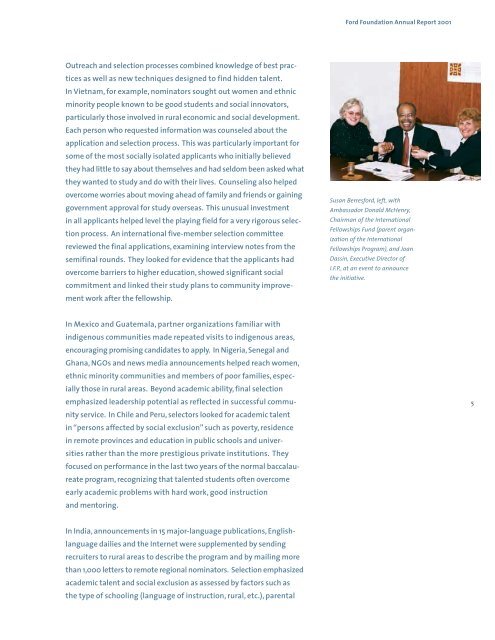2001 Annual Report - Ford Foundation
2001 Annual Report - Ford Foundation
2001 Annual Report - Ford Foundation
Create successful ePaper yourself
Turn your PDF publications into a flip-book with our unique Google optimized e-Paper software.
<strong>Ford</strong> <strong>Foundation</strong> <strong>Annual</strong> <strong>Report</strong> <strong>2001</strong><br />
Outreach and selection processes combined knowledge of best practices<br />
as well as new techniques designed to find hidden talent.<br />
In Vietnam, for example, nominators sought out women and ethnic<br />
minority people known to be good students and social innovators,<br />
particularly those involved in rural economic and social development.<br />
Each person who requested information was counseled about the<br />
application and selection process. This was particularly important for<br />
some of the most socially isolated applicants who initially believed<br />
they had little to say about themselves and had seldom been asked what<br />
they wanted to study and do with their lives. Counseling also helped<br />
overcome worries about moving ahead of family and friends or gaining<br />
government approval for study overseas. This unusual investment<br />
in all applicants helped level the playing field for a very rigorous selection<br />
process. An international five-member selection committee<br />
reviewed the final applications, examining interview notes from the<br />
semifinal rounds. They looked for evidence that the applicants had<br />
overcome barriers to higher education, showed significant social<br />
commitment and linked their study plans to community improvement<br />
work after the fellowship.<br />
Susan Berresford, left, with<br />
Ambassador Donald McHenry,<br />
Chairman of the International<br />
Fellowships Fund (parent organization<br />
of the International<br />
Fellowships Program), and Joan<br />
Dassin, Executive Director of<br />
I.F.P., at an event to announce<br />
the initiative.<br />
In Mexico and Guatemala, partner organizations familiar with<br />
indigenous communities made repeated visits to indigenous areas,<br />
encouraging promising candidates to apply. In Nigeria,Senegal and<br />
Ghana, NGOs and news media announcements helped reach women,<br />
ethnic minority communities and members of poor families, especially<br />
those in rural areas. Beyond academic ability, final selection<br />
emphasized leadership potential as reflected in successful community<br />
service. In Chile and Peru, selectors looked for academic talent<br />
in “persons affected by social exclusion” such as poverty, residence<br />
in remote provinces and education in public schools and universities<br />
rather than the more prestigious private institutions. They<br />
focused on performance in the last two years of the normal baccalaureate<br />
program, recognizing that talented students often overcome<br />
early academic problems with hard work, good instruction<br />
and mentoring.<br />
5<br />
In India, announcements in 15 major-language publications, Englishlanguage<br />
dailies and the Internet were supplemented by sending<br />
recruiters to rural areas to describe the program and by mailing more<br />
than 1,000 letters to remote regional nominators. Selection emphasized<br />
academic talent and social exclusion as assessed by factors such as<br />
the type of schooling (language of instruction, rural, etc.), parental

















